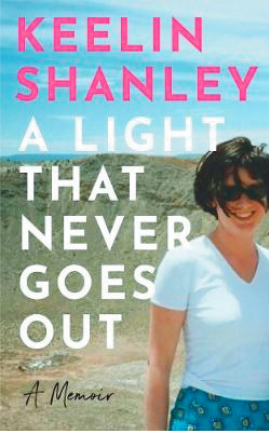
Image: book cover;
Keelin Shanley courtesy of RTÉ.
Eoin Meegan
A Light That Never Goes Out is the posthumous autobiography of one of Ireland’s best known and loved broadcasters. Keelin wrote this book in the weeks and months leading up to her death in February, with the final chapter written by husband Conor Ferguson. Read it with a box of tissues as the book evokes a sense of sadness and of what might have been. It is the story of a woman who is so full of life and with so many things still to do, but painfully aware too that in these pages she is making her final news broadcast.
Keeling Shanley presented a variety of programmes on RTÉ, including the Six One News, Morning Edition, the Consumer Show, Crimeline, Prime Time Specials, and the groundbreaking documentary series Far Away Up Close. She was first diagnosed with breast cancer in 2011, a disease which can be successfully treated in the vast majority of cases. Sadly, in Keelin’s case it was to return five years later where it had spread to the bone and the lungs. On that day in 2016 when she received the news in St Vincent’s, naturally devastated, she writes: “I’m not sure if I cried, but I know Conor [her husband] did. I’d never seen him in tears and at first it was frightening.” (P.5.) Four years later at only 51 she passed away.
From an early happy childhood growing up in Monkstown, with camping holidays to France, recalling red lemonade and ‘sandy sandwiches’, to her days as a young reporter going into dingy flats in Phibsborough and the Inner City to shine a light on those whose lives were broken by drugs, violence, and abuse, it is a book full of many rich stories. Neither is it without its funny moments. For example, the time her cover was blown when she hit the Dublin Nightclub scene incognito to expose a rising drugs culture at the time. Or when she arrived with producer Eddie Doyle early one morning at Fatima Mansions only to be mistaken for undercover cops! The pair had to beat a hasty retreat.
From her parents Keelin got her signature values; strength, tenacity, honesty. From her father, Derry, she inherited her work ethic, and shyness from her mum, Orla. Not many would associate Keelin with shyness, but she was a very private person as well as the outgoing journalist.
“I am far more comfortable asking the questions than answering them” she says (p. 24.)
She married her husband Conor in 2000 and the couple had two beautiful children, Lucy and Ben. These became the centre of Keelin’s life and it is evident how heartbreaking it was for her to know that she must leave them, and that she will miss so many major events in their young lives; graduation, weddings, grandchildren.
Neither does the book gloss over early mistakes. Keelin tells us, with some amusement, of starting out in her ‘scallop-hemmed skirt’, and interviews that didn’t go so well, such as the ones with Martin McGuinness and Ken Loach. And the time she interviewed the late Brian Lenihan when he was Minister for Children, and despite it being a tough interview, being the gentleman he was, Brian later gave her a lift home in his ministerial Merc.
While she loved doing the news, the proud point in Keelin’s journalistic life was making documentaries. The Far Away Up Close series saw her travel to such diverse places as Honduras and Liberia, and perhaps the most moving time was in Bosnia when she visited the mining town of Srebrenica, where a huge grave of murdered civilians had just been discovered.
When RTÉ ventured into morning TV with Morning Edition their obvious choice was Keelin. The powers that be in RTÉ decided this was not going to be a breakfast show (something RTÉ still doesn’t have, they simply repeat the previous day’s Today show), but a ‘serious’ news programme. Morning Edition showed a lot of promise but probably didn’t deliver. Apart from the producer Anthony Murnane, and a couple of researchers, Keelin was more or less on her own, and after the gruelling two hours would be exhausted. But she still loved the buzz and rose to the occasion. Her first interview was with Bill Gates, and she tells how she got off to a bad start by asking him about his taxes.
Then came 2016 which brought mixed fortunes. That was the year her cancer returned, and she knew her time here was limited. It was also the year she was offered Six One, which she was excited about, as well as being very grateful to RTÉ for taking a chance on her when she was ill. Standout memories from it for her were the Cervical Check controversy and the Eight Amendment. She became great friends with co-presenter and former Washington correspondent Caitríona Perry, who would cover for her when she had to go into hospital. Keelin writes of her colleague: “her kindness and instinctive desire to help was so brilliant.” (P. 171.)
After her second diagnosis she heard about a revolutionary new treatment in the US that involved trying to get your own immune system to fight the cancer. Willing to try anything and brave to the end she went to Washington DC to have all the tests, only to learn later that she was an unsuitable candidate. That last piece of news was her final awareness that she could fight no more. Keelin was to return to Ireland where in the last months of 2019 she wrote this moving account of her life, as a memorial to her children.
Her advice to anyone wanting to work in TV or journalism is not to ask open-ended questions. The trick, she says, was to take away the interviewee’s preamble, and frame the question in such a way that they were forced to answer it. Another sterling piece of advice was the art of listening:
“people fill silence with all kind of confessions, but also with the kind of truths that make you really reflect on life. That’s really what I took away from those early, frantic years in television, that listening, not talking, is the number one skill in reporting. For a chatterbox, it was a valuable lesson.” (p. 65.)
Excellent advice for anyone contemplating a career in journalism or broadcasting. As a great listener, broadcaster, and an insightful interviewer Keelin is still greatly missed. This is a lovely book from a lovely person, in every sense of that word; and one that, doubtless, will grace many homes this
Christmas.
Winner in RTÉ Radio 1 Listeners’ Choice category in An Post Irish Book Awards 2020. Overall winner will be announced on December 10th.



